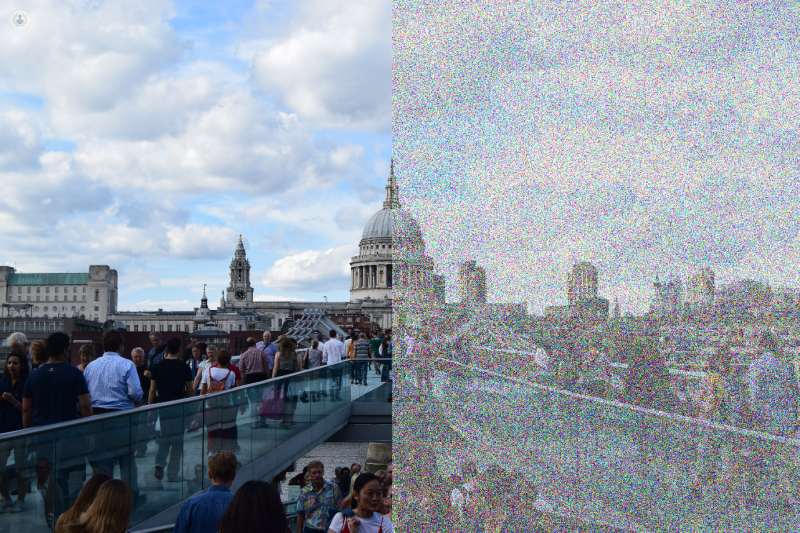Visual snow: what is this mysterious neurological condition?
Written by:Visual snow syndrome is a benign but disconcerting neurological condition in which people’s vision becomes grainy or pixelated. Some describe it as small flickering dots, almost resembling the noise of a detuned analogue television. Dr Mark Weatherall, a consultant neurologist in the UK, explains how common this condition is and what treatments, if any, are available.

How would I know if I had visual snow syndrome?
A lot of people with visual snow have never experienced life without it, meaning they don’t recognise that what they see is abnormal. It’s also impossible to detect from an eye examination.
Most people will experience this grainy vision and it can be seen when the person’s eyes are open and closed.
It affects the whole of the visual fields, and is commonly associated with an increased awareness of entopic phenomena – such as floaters – that arise within the eye itself, and with an inability to suppress the ‘just-seen’. This results in people experiencing persistent afterimages or visual trailing.
Is visual snow an eye condition or a neurological condition?
Visual snow has only been recognised as a distinct neurological condition in the last five years. Prior to that it was thought to be a migraine variant. Migraine is more common than one might expect by chance in visual snow sufferers, but the conditions are different, and migraine treatments rarely make any difference to visual snow.
Research studies show unusual activity in some of the visual processing areas of the brain in people with visual snow.
How common is visual snow?
The general prevalence of visual snow in the population is currently unknown.
Many sufferers have had their symptoms dismissed as being due to anxiety, or even wholly made up. There were early reports of the condition occurring following the use of hallucinogenic substances such as LSD, but in most cases it occurs spontaneously, or is present lifelong.
There are no reports of any specific abnormalities being seen in visual snow sufferers who have had MRI brain scans.
Are there any treatments or strategies that can help?
People experiencing visual snow should have a detailed eye examination, to ensure there is no ocular cause for their symptoms, and should see a neurologist to rule out other conditions that can affect visual processing.
There are at present no proven treatments for visual snow. Some sufferers will follow a relapsing and remitting course over a number of years, while others will find their symptoms do not change significantly over time.
There are a few reports of spontaneous remission from visual snow. There are no reports of patients with visual snow going blind from their condition, nor would that be expected from what we know about this rare but characteristic neurological disorder.
If you think you may have this condition, visit Dr Mark Weatherall’s profile and make a consultation with him to discuss your symptoms.


